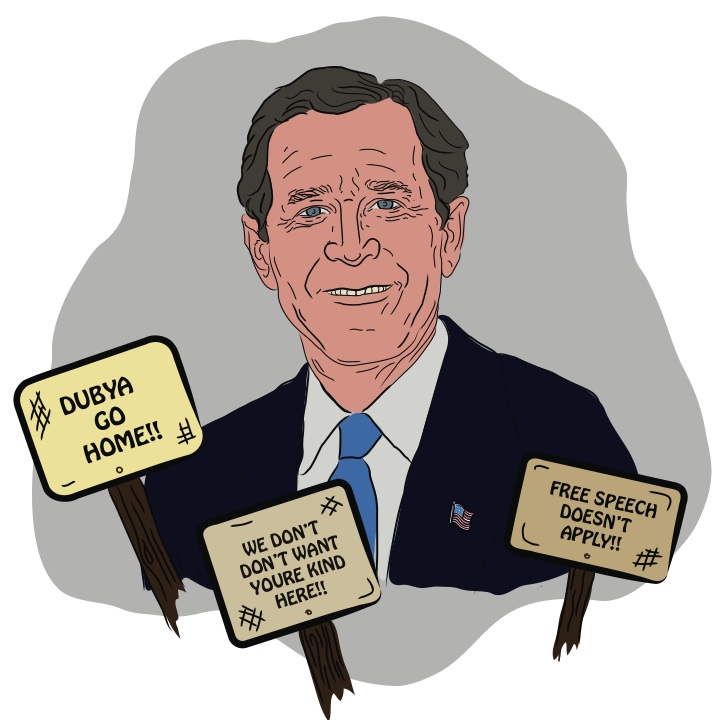IAN REGNIER
Opinions Writer
It has been confirmed: George W. Bush is coming to talk at TCU Place on Oct. 21 and already a whole lot of Saskatchewan folk ain’t all too pleased about this war-mongering, gun loving, cowboy ex-president having an invite to our beautiful province.

To express this dismay, a Saskatoon-based group cleverly dubbed the George Bush Welcoming Committee (GBWC) has laid out a bill of indictment as to why Dubya should not be so “welcome” after all. Anyone who feels this way is gladly invited to come out to the downtown streets that October afternoon and sound out their catchy chants, parade their placards and raise a big shitstorm to earn the Saskatoon police some overtime.
However, I would also invite them to flip back their calendars to March 2009 and remember how their Calgarian comrades handled said invitee. To portray their collective visceral loathing for America’s 43rd president, various tactics such as shoe throwing, megaphone blasting and heckling the event attendees was good enough to relay the message to the national media.
But within these bellows there was a sinister implication at hand, which is that some (or probably most) protesters desired to completely ban Bush from speaking. Now, Houston, we have a problem.
Despite Bush’s occasional linguistic deficiencies, the free speech principle holds that no matter how controversial or unpopular a person is, he or she still has the right to be heard. Unfortunately, those in Calgary would have willingly sacrificed this principle in order for their “war criminal” allegations to be the overarching discourse. Take a minute to sift through the messages on the GBWC Facebook wall and you will find fumes of the same stench.
All the arguments harping back to “war criminal” refer to the American military ventures in Afghanistan and Iraq, which are very controversial ventures indeed. To take the example of Iraq, such an allegation inevitably leads to a debate between those who sought Iraq’s liberation versus those who were content with the preservation of its psychopathic dictator and his regime.
But do those who believe the latter really have the moral high ground? And if so, is it so high that they can call the shots on who may or may not speak in our cities?
For those who vow a confident “yes” I must divert your attention to the week after Bush’s Calgary visit, when Canadian Immigration Minister Jason Kenney and the Jewish Defense League (JDL) upheld the Canadian Border Patrol’s decision to bar British parliamentarian George Galloway from entering Canada under clause Section 34 (1) of the Immigration and Refugee Protection Act (IRPA).
Galloway was denied entry because of his participation in leading an aid convoy to the Hamas government in Gaza earlier that month. The Canadian government deemed this action as supporting a “terrorist organization” and saw Galloway’s admission as a security threat.
And what did numerous people (including those who wanted to ban Bush) hoot and holler about upon this decision? Free speech! It cannot be more ironic that the Canadian group named Lawyers Against the War is also attempting to use the IRPA to deny Bush’s entry just as Kenney and the JDL enforced it on Galloway. The IRPA is not Canada’s free speech trump card.
This hypocrisy of the protesters and the Canadian authorities is offensive in two fundamental ways. The controversial nature of people like Bush and Galloway makes their right to speak even more important. Secondly, my concern with controversial speakers’ right to speak is not as great as my right to listen.
Sorry friends. No protection is needed from the boogieman’s ideas. Hear what has to be said, then be critical. I concur with Peter Garden, founder of the GBWC, who stated in the StarPhoenix: “I’m not going to stop him from speaking but I’ll voice my concerns.” Let that be reiterated for everyone: All voices allowed. Oct 21. The date is set. No petty censorship but rather a fiery dialectical exchange. That’s how to enlighten others to your cause.